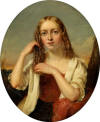Captain William Douglas
William Douglas of Fingland, son of Archibald Douglas of Fingland and
Marion Kennedy (of Auchtyfardel) was born at nearby Sanquhar Castle when Morton
Castle was in need of repair.
Annie Laurie
 |
Annie Laurie
William Wallace
(1801–1866) |
It is traditionally thought that William Douglas, a soldier in the
Royal Scots, wrote the words to this old Scottish love song after falling
for the daughter of Robert Laurie, the first baronet of Maxwelton, three
miles east of Moniaive in Dumfries and Galloway.
Also known as "Maxwelton's Braes" (riverbanks), the lines
attributed to Douglas speak of a lovers' pact with "bonnie Annie
Laurie". The soldier, who rose to become a captain before his
Jacobite allegiances resulted in his exile, is believed to have had a
romance with Anne Laurie while she was still in her teens.
If there was any romance, it is likely her father opposed the match,
either because his daughter was too young, or because of Douglas's
political beliefs. Both went on to marry other people, Laurie marrying the
Laird of Craigdarroch and Douglas eloping with a Lanarkshire heiress,
Elizabeth (Betty), the daughter of Captain Alexander Clerk of Glendorth
(Glendoik).
The words were first recorded in 1823 in Sharpe's Ballad Book. It
became popular with soldiers in the Crimean War thanks to
Lady John Scott,
who modernised the verses and set it to music. In the late 1850s, she
published the song as part of a collection of verse sold to benefit the
widows and orphans of those who had fought in the Crimea.
Captain William Douglas' home was at
Fingland only 12 miles from Annie's
Maxwelton, but they appear to have had their first meeting at an Edinburgh
ball. They fell in love, but there were complications. Annie's father, who
had been knighted by James VII two years after she was born, was a strong
Royalist and a vigorous persecutor of Jacobites and Covenanters--not
surprising since he was a cousin of the notorious butcher of Covenanters,
Grierson of Lag. Indeed, it was in recognition of his anti-Jacobite and
anti-Covenanter activities that he received his knighthood.
Captain
Douglas, on the other hand, was pledged to the Stuart cause, a Jacobite to
the backbone, so that Sir Robert's attitude towards him as a son-in-law
was less than enthusiastic. In any case, Douglas was something of a rough
diamond, an expert swordsman with a fiery temper that landed him in a
succession of duels. Legend has it that on one occasion he was literally
crossing swords with Sir Robert when Annie came on the scene and put an
end to it. Another opponent, wounded and disarmed by Douglas, later
declared that he was defeated less by Douglas's skill than by his "fierce
and squintin eyen".
Despite Sir Robert's disapproval, Annie and her
lover continued to meet secretly in the seclusion of Maxwelton Braes until
news came that a Stuart invasion was about to be launched. Captain Douglas
had to leave at once for Edinburgh, but before he spurred away he penned
his poetic tribute to his loved one, making up in passionate enthusiasm
whatever may have been lacking in elegance and literary merit. Here is how
he described the, apparently, shapely Annie:
She's backit like a
Peacock,
She's breastit like a swan,
She's jimp about the middle,
Her waist ye weill may span,
Her waist ye weill may span,
And she
has a rollin' eye,
And for bonnie Annie Laurie
I'll lay down my head
and die.
Like his grandfather, James of Morton, he was a
Commissioner of Supply in Dumfries, in 1693
He died in 1760. His son General Archibald Douglas 1707-1778 managed to conceal his Jacobite roots. He served as aide de camp to George 11 at the Battle of Dettingen and was one of those responsible for escorting Charlotte of Mecklenburg-Strelitz to marry George 111 securing in the process positions for his daughters at Court. Although he moved the family to live in Witham Essex he remained MP for Dumfries Burghs from 1754 to 1774.
|
Help wanted!
We would welcome biographical details for this person.
Click to contribute
Please note that if you employ Spam Assassin, or similar email
blockers, then you must ensure that you can receive emails from
douglashistory.co.uk
|
|
|


